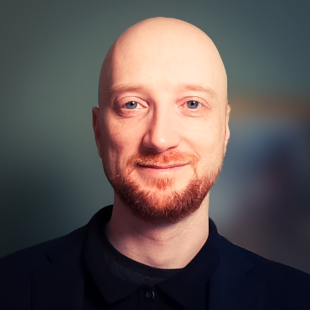Undergraduate Experience
David is one of those characters who engages passionately in anything that he does.
During his undergraduate degree in Mechanical Engineering at the University of Salford, alongside completing a successful research project in bio-mechanics which led to multiple academic publications, he spent a year in Denmark on an ERASMUS scholarship, undertook an internship with a semi-conductor company, volunteered in a community centre teaching maths to the Somali community, and supported several other initiatives on a voluntary basis, including a local entrepreneur who was developing a commercial rocket venture.
He graduated having made the most of the opportunities available as an undergraduate to gain broad experience. As he looked to establish where to go next, he finished up with several offers of PhDs working in nuclear fusion, nuclear fission and neuro-science as well as an offer from IDCORE.
This success gave David the opportunity to reflect on what was driving him. He knew he wanted to be involved in doing something about the climate crisis, and decided that IDCORE would provide the best opportunity to make a difference. He already had some knowledge of the industry, as he had spent his ERASMUS year on a mechanical design course in Aarhus, learning how to design wind turbines for Vestas. He saw offshore renewables as offering an opportunity to be creative, working in a nascent industry on new technologies with the greatest opportunities for impact. He also liked the idea of spending at least the first year in Edinburgh, and the funding available to support this move was higher than for the other options.
Project
David’s IDCORE project was sponsored by INNOSEA, a French marine renewables engineering consultancy with offices in Edinburgh. He developed numerical modelling software for them, designed to provide them with advanced wave energy converter (WEC) simulation capability. The project was challenging but successful, helping INNOSEA to explore a wide range of concepts and systems which will be important if this part of the industry is to move forward. However, it was difficult for INNOSEA to turn the software into a commercial product since an open-source challenger was simultaneously being developed which has now become the industry standard software.
Quote: David Ogden, Research Engineer, National Renewable Energy Laboratory, USA
‘Since leaving IDCORE I have been working for the National Renewable Energy Laboratory (NREL) in the USA. They are based in Boulder, Colorado, so between handing in my thesis and moving there I also got married.
The work went really well. I was initially working with NASA using my knowledge of numerical modelling in a marine environment to support design work for the return to Earth for the Artemis programme. I was promoted quickly, and was soon leading a wave energy numerical modelling team and acting as the principal investigator on a big research project.
Our work is divided into two main areas. First, we develop simulation software to help WEC technology developers gain new insights. Second, we work directly with developers to create and simulate numerical models of their systems. Soon we’ll begin developing a new WEC simulation platform called SEA-Stack, which we hope will enable new breakthroughs in wave energy!’
Legacy
David identifies a wide range of benefits from the time he spent with IDCORE and sees the EngD model as a very effective way of developing the skill set needed by organisations like NREL. The training modules delivered by IDCORE and the experience he gained working in a consultancy helped develop a set of skills which he regularly calls upon on NREL projects. He views the experience as invaluable, providing opportunities that even others working in the industry don't get.
NREL conducts advanced research and development programmes and is a world leader in the state-of-the-art for renewable energy technologies, supporting industry and product development. David’s IDCORE experience prepared him well for the role he now has with them and he is surprised that no-one has yet tried to replicate the model in the US. Not only has it given him a valuable set of skills, it has also provided him with a ready-made network of former IDCORE colleagues across the industry that he continues to engage with on a regular basis.







